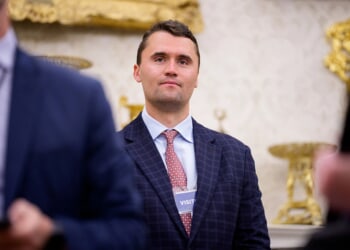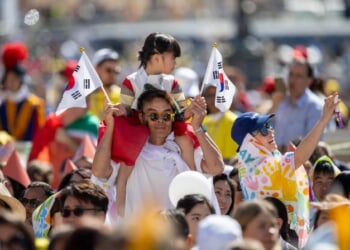Dr Sarah Ingham is the author of The Military Covenant: its impact on civil-military relations in Britain.
Last week, reports of self-inflicted Stamp Duty woes quickly overshadowed the summit of the Shanghai Cooperation Organisation.
The SCO has a revolving presidency: it’s now China’s turn. President Xi Jinping hosted the conclave of global strongmen who gathered in the port city of Tianjin (population 14 million), which turns out to be a handy 60 or so miles from Beijing.
Founded in 2001, the SCO was initially just six members; China, Russia and four “stans” which had been part of the former Soviet Union’s empire: Kazakhstan, Kyrgyzstan, Tajikistan and Uzbekistan.
How times rapidly change.
Now a loose group of 10, the SCO has grown in status. Xi was joined not just by Vladimir Putin, but by the leaders from 18 other non-Western states, including India’s Narendra Modi. While not a fully-fledged member, Afghanistan is one of two observer states; Sri Lanka, Türkiye and Saudi Arabia are among 14 dialogue partners. The official working languages are Chinese and Russian.
The foreign affairs think tank Chatham House said the summit gave Xi the opportunity to “present China as a beacon of stability”. Indeed, in his keynote speech, the Chinese President stressed that the SCO should remain a force for stability, continuing “to dismantle walls, not erect them” and seeking “integration, not decoupling.” Invoking the SCO “family”, he also underlined that China “will readily share the opportunities of its vast market”.
Two days later, it was off to the Chinese capital for the commemoration of the 80th anniversary of the victory of the Chinese People’s War of Resistance against Japanese Aggression and the World Anti-Fascist War. Any expectations about a solemn ceremonial of wreath-laying would be confounded: instead, there was a perfectly choreographed parade of military might.
At a post-parade reception, Xi stated that China “will always be a force for peace stability and progress in the world”. The flowery translation (“brightness shines in our world”) supplied by China’s Foreign Ministry contrasts with the weaponry on display in Tiananmen Square and the Avenue of Heavenly Peace.
Unmanned helicopters, long-range hypersonic missiles, laser guns, robot wolves … Weapons-wonks like Binkov’s Battlegrounds have been kept busy cataloguing all the hardware, which reportedly includes 47 new systems out of 76.
The message being sent is easily understood by a Western audience, thanks to Beijing’s thoughtfulness in clearly marking each system with the Western alphabet and numerals. The YJ-21 is an anti-ship cruise missile known as the carrier killer.
Xi had walked the red carpet to watch the spectacle flanked by Vladimir Putin and North Korea’s Kim Jong Un. The pair are brother-in-arms in Ukraine, following Pyongyang’s deployment of thousands of its troops to aid Moscow late last year.
Did last week’s parade confirm Asia’s ascendancy?
With China’s rise over the past few decades, the centre of global gravity has been shifting. As the West was expending precious blood and treasure on long drawn-out comparatively small wars, Beijing was quietly making friends and building bridges. Literally.
About 150 countries have signed Memoranda of Understanding in connection with Beijing’s Belt and Road Initiative. In partnership with China, infrastructure has been, is being, or will be, developed everywhere from Antigua to Zanzibar. While generally found in the global south, it includes the recent makeover of the ancient port of Piraeus in Athens.
President Xi has likened the Initiative to a new Silk Road, alluding to the millennia-old trade routes that criss-crossed central Asia from China to the Mediterranean. Traversing thousands of miles of deserts, steppes, mountain ranges, rivers and cities such as Samarkand, the Silk Roads of history also brought conquest, whether by Alexander the Great, Genghis Khan or Tamburlaine.
Among the empires today’s central Asian “stans” have seen rise and fall are the Greek, Roman, Persian, Mongol, Timurid, Russian, Soviet and British. Throughout the 19th century, the region was key to the so-called Anglo-Russian Great Game, played by diplomats, spies and soldiers. The prize was control of the crucial routes to India and its trade.
In 2008 while Trade Envoy, Prince Andrew allegedly told a gathering in the Kyrgyz capital Bishkek that the West was “back in the thick of playing the Great Game” and “this time we aim to win.” Today, sharing its vast market opportunities, China is busy building roads in the country’s east.
The UK can, however, take comfort that Wales beat rare-earth mineral-rich Kazakhstan 1-0 in the World Cup qualifier in Astana.
Xi’s very public backing for Putin last week adds another dimension to this week’s incursion into Poland’s airspace by 19 Russian drones.
In Britain there are more pressing matters than strategic relevance and a coherent China policy: ministerial musical chairs, another governing party talking to itself, the Mandelson Distraction and, tomorrow, the annual dust-up over the Last Night of the Proms.
Rule, Britannia!





![Gavin Newsom Threatens to 'Punch These Sons of B*thces in the Mouth' [WATCH]](https://www.right2024.com/wp-content/uploads/2025/08/Gavin-Newsom-Threatens-to-Punch-These-Sons-of-Bthces-in-350x250.jpg)
![ICE Arrests Illegal Alien Influencer During Her Livestream in Los Angeles: ‘You Bet We Did’ [WATCH]](https://www.right2024.com/wp-content/uploads/2025/08/ICE-Arrests-Illegal-Alien-Influencer-During-Her-Livestream-in-Los-350x250.jpg)








